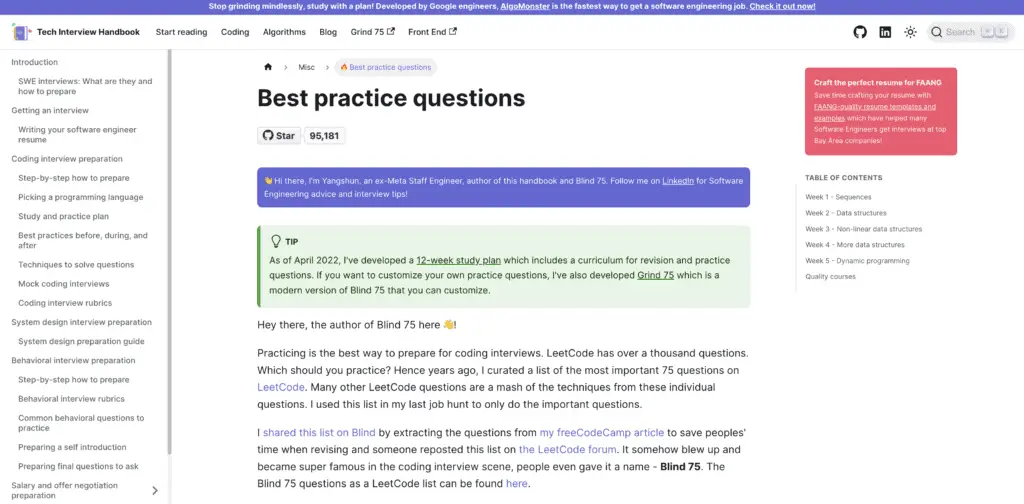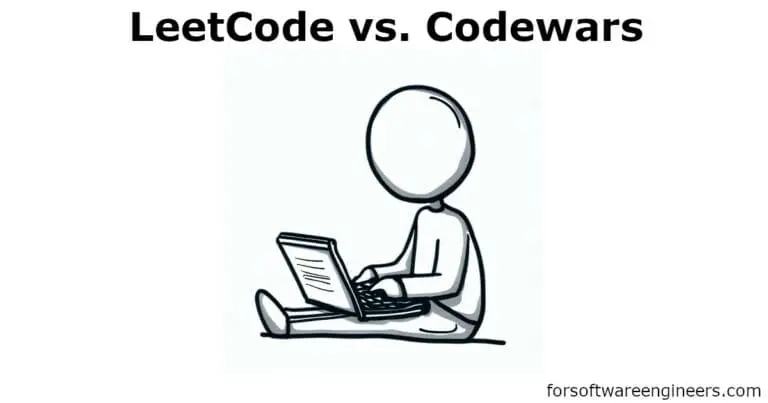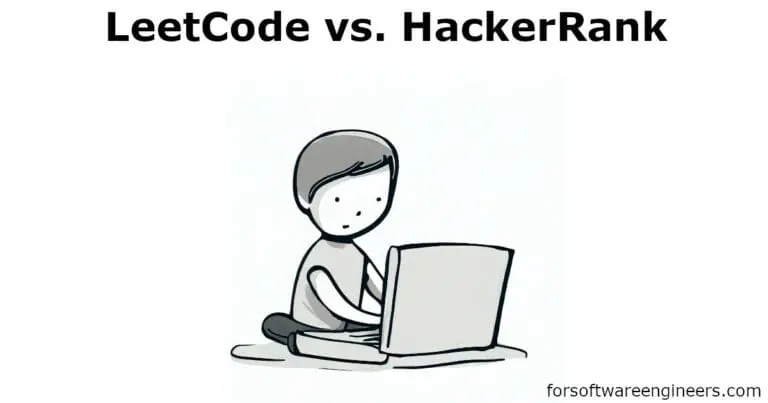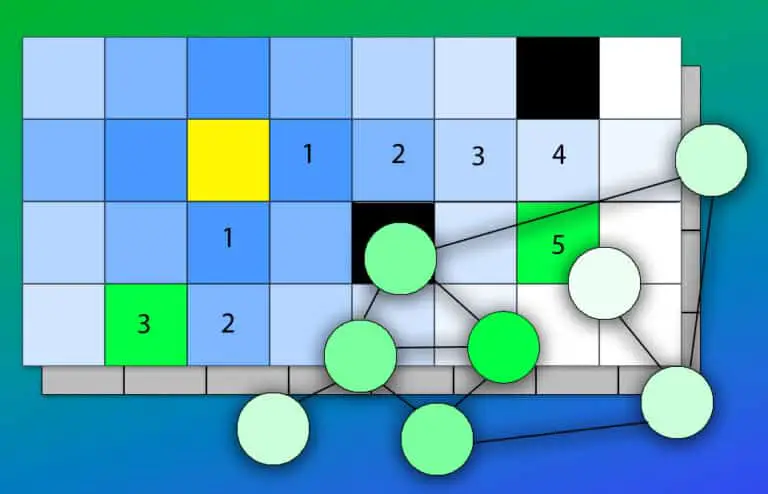LeetCode Blind 75 (Grind 75): What It Is, Questions, and Study Plan
LeetCode (abbreviated LC) is a platform that software engineers use to practice coding problems (called LeetCode questions or LeetCode problems) for coding interviews. The Blind 75 (also called the LeetCode Blind 75) is a focused list of curated LeetCode problems that cover the most common types of problems and patterns that are asked within real software engineer technical interviews.

In this article, we’re discussing what the LeetCode Blind 75 is in more detail, describing its origins, association with another list of questions called the Grind 75, and topics of problems it covers. Additionally, we will be mentioning what the specific questions are in the Blind 75 along with a study plan for it to prepare for software engineering coding interviews.
What Is The Blind 75?
The LeetCode Blind 75, often called solely the Blind 75, is a curated list of 75 LeetCode questions that cover the most common questions and question patterns asked within coding interviews. It’s one of the most popular lists of LeetCode questions that people use to prepare for software engineering coding interviews in the world. Yangshun Tay, a staff engineer at Meta, created it when he was in his software engineer job search.
The image below depicts the official website of the Blind 75’s creator, where he hosts the Blind 75 list of questions.

The main technical interview topics that the questions within the Blind 75 provide are listed below.
- Array
- Binary Manipulation
- Dynamic Programming
- Graphs
- Interval
- Linked List
- Matrix
- String
- Tree
- Heap
The reason it’s called the Blind 75 is because the list of 75 LeetCode questions originated from a site called TeamBlind (also known as Blind, a career-centric forum where people can post messages anonymously). It became popular because of how effective and organized the question set was in preparing people for coding interviews, with 75 questions as opposed to over 200.
Over time, the Blind 75 was succeeded by a newer list by Yangshun called the Grind 75 which contains updated LeetCode questions and more LeetCode questions. As a result, many people conflate calling the Blind 75 list of questions the Grind 75 list of questions, and vice-versa. Effectively, they serve the same purpose, helping people learn about LeetCode questions for interview preparation.
Should You Do The Blind 75 List Of LeetCode Questions?
Yes. You should do the Blind 75 list of LeetCode questions if you’re trying to prepare for coding interviews because the Blind 75 provides you with a structured and optimal approach to preparation. The Blind 75 is especially useful for beginners preparing for software engineering interviews because it covers a mix of easy, medium, and hard questions in a logical progression.
Is The Blind 75 Still A Relevant List In 2023?
Yes. The Blind 75 (and Grind 75) is a relevant list in 2023, and it will likely be relevant perpetually into the future. This is because the topics and patterns that are covered in a coding interview are fundamental, meaning that you only need to learn them once because they never change. The only thing that changes is slight variations in how the topics and patterns are used in implementation.
Is The Blind 75 Hard?
Yes. The Blind 75 is a hard list of questions for people who are new to completing technical interview questions. However, there are easier questions in the list that beginners can practice doing before working on the harder questions on the list. For someone who is familiar with coding interviews, the Blind 75 is a moderately challenging list of questions to complete.
What Are Alternative LeetCode Questions To The Blind 75 List Of Questions?
Alternatives to the Blind 75 list of LeetCode questions include the Grind 75 (from the same creator of the Blind 75), LeetCode’s official curated lists (i.e., top 100 most liked questions), and the NeetCode 150 (a curation of 150 LeetCode questions for interview preparation, by NeetCode from YouTube).
Each of these lists serves the same purpose, to prepare an individual for coding interviews. The most commonly chosen list of questions to prepare for coding interviews are the Blind 75, Grind 75, and NeetCode 150.
What Are The Blind 75 LeetCode Questions?
The questions on the Blind 75 list of LeetCode questions are listed below, categorized by the 10 topics of arrays, binary manipulation, dynamic programming (dp), graphs, intervals, intervals, linked lists, matrixes, strings, trees, and heaps.
- Array
- Two Sum https://leetcode.com/problems/two-sum/
- Best Time to Buy and Sell Stock https://leetcode.com/problems/best-time-to-buy-and-sell-stock/
- Contains Duplicate https://leetcode.com/problems/contains-duplicate/
- Product of Array Except Self https://leetcode.com/problems/product-of-array-except-self/
- Maximum Subarray https://leetcode.com/problems/maximum-subarray/
- Maximum Product Subarray https://leetcode.com/problems/maximum-product-subarray/
- Find Minimum in Rotated Sorted Array https://leetcode.com/problems/find-minimum-in-rotated-sorted-array/
- Search in Rotated Sorted Array https://leetcode.com/problems/search-in-rotated-sorted-array/
- 3Sum https://leetcode.com/problems/3sum/
- Container With Most Water https://leetcode.com/problems/container-with-most-water/
- Binary
- Sum of Two Integers https://leetcode.com/problems/sum-of-two-integers/
- Number of 1 Bits https://leetcode.com/problems/number-of-1-bits/
- Counting Bits https://leetcode.com/problems/counting-bits/
- Missing Number https://leetcode.com/problems/missing-number/
- Reverse Bits https://leetcode.com/problems/reverse-bits/
- Dynamic Programming
- Climbing Stairs https://leetcode.com/problems/climbing-stairs/
- Coin Change https://leetcode.com/problems/coin-change/
- Longest Increasing Subsequence https://leetcode.com/problems/longest-increasing-subsequence/
- Longest Common Subsequence –
- Word Break Problem https://leetcode.com/problems/word-break/
- Combination Sum https://leetcode.com/problems/combination-sum-iv/
- House Robber https://leetcode.com/problems/house-robber/
- House Robber II https://leetcode.com/problems/house-robber-ii/
- Decode Ways https://leetcode.com/problems/decode-ways/
- Unique Paths https://leetcode.com/problems/unique-paths/
- Jump Game https://leetcode.com/problems/jump-game/
- Graph
- Clone Graph https://leetcode.com/problems/clone-graph/
- Course Schedule https://leetcode.com/problems/course-schedule/
- Pacific Atlantic Water Flow https://leetcode.com/problems/pacific-atlantic-water-flow/
- Number of Islands https://leetcode.com/problems/number-of-islands/
- Longest Consecutive Sequence https://leetcode.com/problems/longest-consecutive-sequence/
- Alien Dictionary (Leetcode Premium) https://leetcode.com/problems/alien-dictionary/
- Graph Valid Tree (Leetcode Premium) https://leetcode.com/problems/graph-valid-tree/
- Number of Connected Components in an Undirected Graph (Leetcode Premium) https://leetcode.com/problems/number-of-connected-components-in-an-undirected-graph/
- Interval
- Insert Interval https://leetcode.com/problems/insert-interval/
- Merge Intervals https://leetcode.com/problems/merge-intervals/
- Non-overlapping Intervals https://leetcode.com/problems/non-overlapping-intervals/
- Meeting Rooms (Leetcode Premium) https://leetcode.com/problems/meeting-rooms/
- Meeting Rooms II (Leetcode Premium) https://leetcode.com/problems/meeting-rooms-ii/
- Linked List
- Reverse a Linked List https://leetcode.com/problems/reverse-linked-list/
- Detect Cycle in a Linked List https://leetcode.com/problems/linked-list-cycle/
- Merge Two Sorted Lists https://leetcode.com/problems/merge-two-sorted-lists/
- Merge K Sorted Lists https://leetcode.com/problems/merge-k-sorted-lists/
- Remove Nth Node From End Of List https://leetcode.com/problems/remove-nth-node-from-end-of-list/
- Reorder List https://leetcode.com/problems/reorder-list/
- Matrix
- Set Matrix Zeroes https://leetcode.com/problems/set-matrix-zeroes/
- Spiral Matrix https://leetcode.com/problems/spiral-matrix/
- Rotate Image https://leetcode.com/problems/rotate-image/
- Word Search https://leetcode.com/problems/word-search/
- String
- Longest Substring Without Repeating Characters https://leetcode.com/problems/longest-substring-without-repeating-characters/
- Longest Repeating Character Replacement https://leetcode.com/problems/longest-repeating-character-replacement/
- Minimum Window Substring https://leetcode.com/problems/minimum-window-substring/
- Valid Anagram https://leetcode.com/problems/valid-anagram/
- Group Anagrams https://leetcode.com/problems/group-anagrams/
- Valid Parentheses https://leetcode.com/problems/valid-parentheses/
- Valid Palindrome https://leetcode.com/problems/valid-palindrome/
- Longest Palindromic Substring https://leetcode.com/problems/longest-palindromic-substring/
- Palindromic Substrings https://leetcode.com/problems/palindromic-substrings/
- Encode and Decode Strings (Leetcode Premium) https://leetcode.com/problems/encode-and-decode-strings/
- Tree
- Maximum Depth of Binary Tree https://leetcode.com/problems/maximum-depth-of-binary-tree/
- Same Tree https://leetcode.com/problems/same-tree/
- Invert/Flip Binary Tree https://leetcode.com/problems/invert-binary-tree/
- Binary Tree Maximum Path Sum https://leetcode.com/problems/binary-tree-maximum-path-sum/
- Binary Tree Level Order Traversal https://leetcode.com/problems/binary-tree-level-order-traversal/
- Serialize and Deserialize Binary Tree https://leetcode.com/problems/serialize-and-deserialize-binary-tree/
- Subtree of Another Tree https://leetcode.com/problems/subtree-of-another-tree/
- Construct Binary Tree from Preorder and Inorder Traversal https://leetcode.com/problems/construct-binary-tree-from-preorder-and-inorder-traversal/
- Validate Binary Search Tree https://leetcode.com/problems/validate-binary-search-tree/
- Kth Smallest Element in a BST https://leetcode.com/problems/kth-smallest-element-in-a-bst/
- Lowest Common Ancestor of BST https://leetcode.com/problems/lowest-common-ancestor-of-a-binary-search-tree/
- Implement Trie (Prefix Tree) https://leetcode.com/problems/implement-trie-prefix-tree/
- Add and Search Word https://leetcode.com/problems/add-and-search-word-data-structure-design/
- Word Search II https://leetcode.com/problems/word-search-ii/
- Heap
- Merge K Sorted Lists https://leetcode.com/problems/merge-k-sorted-lists/
- Top K Frequent Elements https://leetcode.com/problems/top-k-frequent-elements/
- Find Median from Data Stream https://leetcode.com/problems/find-median-from-data-stream/
Does The Blind 75 List Of Questions Have LeetCode Premium Questions?
Yes, the Blind 75 list of questions contains LeetCode premium questions. The LeetCode premium questions are Alien Dictionary, Graph Valid Tree, Number of Connected Components In A Undirected Graph, Meeting Rooms, Meeting Rooms II, and Encode and Decode Strings, as of recently.
It’s important to understand that LeetCode frequently changes its labels for which questions are premium, so you should check with the website.
How Should You Study The Blind 75 List Of Questions?
You should study the Blind 75’s list of questions by going through all of the easy questions of each category while progressing through the harder problems. By the time you finish practicing the questions in the Blind 75, you should be able to know how to identify the common patterns that are asked in interview questions.
If there are any LeetCode questions within the Blind 75 that you’re not comfortable with, you should make sure to practice doing more of those types of problems to become comfortable with the type of question. Every question within the Blind 75 is important to understand on a deep level if your goal is to pass coding interviews.
How Long Does It Take To Study The Blind 75?
The duration of time it takes to study the Blind 75 is about 1 to 3 months but varies depending on the individual’s prior experience with coding interview preparation, programming, data structures, and algorithms.
Can You Study The Blind 75 In 3 Months?
Yes. You can definitely learn the tricks and techniques of the Blind 75 list of LeetCode questions within 3 months of studying about an hour or two per day, on weekdays. This is a perfect duration for beginners to learn about interview preparation.
Can You Study The Blind 75 In 2 Months?
Yes. You can definitely learn the tricks and techniques of the Blind 75 list of LeetCode questions within 2 months of studying about an hour or two per day, on weekdays. However, you may need to study for multiple hours on the weekends as well.
Can You Study The Blind 75 In 1 Month?
Maybe. Studying the Blind 75 in a month to a level where you’ll be proficient in solving coding interview problems is plausible if you already have experience with coding interviews, data structures, and algorithms. Otherwise, this is too short of a duration for a beginner to internalize all of the information contained in the 75 LeetCode questions.






